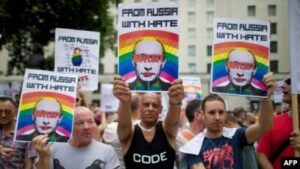
In the 1990s and 2000s, there was something queer about Russian television. Images of LGBT people were nothing out of the ordinary on Russian TV or other pop culture media. There were clips of queer singer-songwriter Shura, the program Full Fashion with Sergei Zverev, songs by the bands Nochnye Snaipery and Reflex. Transvestite culture was also extremely popular, albeit in a satirical context. At her peak was the almost sacred Verka Serduchka, a Ukrainian artist. Evening shows dealt with issues such as the lives of transgender people and male prostitution. Since 2014, however, the majority of Russian TV has turned LGBT people into the regime’s main enemy. Viewers are fed a steady stream of political talk shows with guests espousing hate group ideologies from morning to night.
After the ban against “homosexual propaganda” was enacted in 2013, discussion of LGBT issues was largely silenced. A phrase borrowed from American conservatives, “traditional values,” started to be used as a way to divide people. Following the invasion of Ukraine in February 2022, the discussion of LGBT issues became part of an effort to divert attention from the war. Content that was once frowned upon began to flow from all of the state channels. Vladimir Putin himself entered the discussion, referring to transgender people as “transformers.” The statistics show that suicide is several times more frequent for LGBT people than for straight people.
Stories that go beyond the bounds of reason have since become the norm on federal stations. Take the summary of one of the news stories: Russian special forces destroyed a “dangerous gang of Ukronazi terrorists.” Among the weapons they found were satanic cult items and LGBT attributes. This claim would be manifestly ridiculous if it were not reported on one of the main stations of the country as serious news. One of Russia’s best-known propagandists, Yevgeny Kiselyov, suggests burying gay men’s hearts in the ground after a traffic accident, so that they don’t go to those in need of transplants. In the program Besogon, Oscar-winning director Nikita Mikhalkov compares gay parades to those of zoophiliacs.
It is hard to find a more eloquent speaker in the art of insulting people than the popular favorite Vladimir Soloviev. He tries to shine in this field, following and commenting on every event in the life of the global LGBT community, all the while chanting holy scriptures with dexterity. Or there are the state-backed journalists Margarita Simonyan and Olga Skabeeva, women who had shabby but successful careers and could have become respected journalists, but who now promote “family values,” i.e. patriarchal values, and condemn the gay community.
The most important issue at the moment is still the anti-transgender legislation that was enacted last summer. It prohibits necessary medical procedures for transgender people, even those who fall under internationally recognized standards of care. The law also authorizes surgery on intersex children without their consent or medical necessity. The law has been widely criticized by human rights advocates, LGBT activists, and the medical community in Russia and beyond. Human Rights Watch described it as a violation of human rights. The original version of the Transgender Transition Ban prohibited medical support for transgender transition. In response to criticism, the bill was tightened. The final version stripped transgender people of the right to adopt or have custody of children and annulled marriages performed by transgender people.
Shortly before this law was passed, federal stations began broadcasting news of a discriminatory nature, and they have since continued. The tone of these stories is always the same: sneeringly incredulous, denying the possibility of the existence of such people in Russian society and in nature in general. And the argument is always the same: that women and men have certain primary sexual characteristics, full stop. They find a few scientific-sounding experts, i.e., conservative foreigners with opinions about transgender people, and cite a few sources like The New York Post or Newsmax. The padding of the plot is always queerly exaggerated: clips of gay pride parades to create the effect that these parades happen every day in the U.S. and Europe.
The only thing we can hope for is that the media don’t make too many stupid mistakes, and that the work of Putin’s propaganda machine doesn’t hurt too many innocent people. Fortunately, the times we live in still give LGBT people in Russia access to alternative online media and to very important information that cannot be found in a vacuum inside the country.
Diana Sadretdinova is a freelance journalist and volunteer of the Coming Out group.




